SPRING IS HEEERRRRREE! (Read that in Oprah’s excited yelling voice). As soon as that sun starts to shine and the days get a little longer I feel every cell in my body wake up and I instantly start craving super fresh flavors. This Parsley Pesto Pasta with Peas is a great “transitional” recipe to take you from cold grey winter days into the sunny days of spring. It tastes super bright and fresh, but doesn’t require a lot of really seasonal ingredients, which is nice because sometimes my brain is already screaming spring before the fresh produce hits the markets. :P
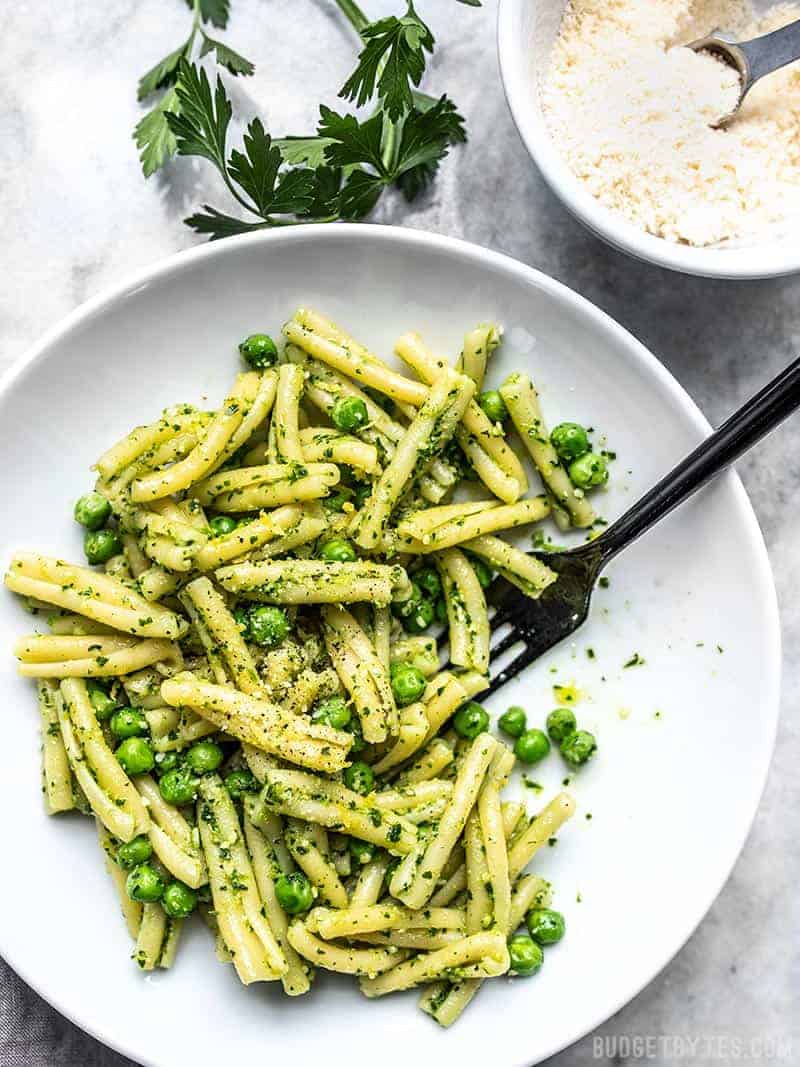
All recipes are rigorously tested in our Nashville Test Kitchen to ensure they are easy, affordable, and delicious.
Parsley Pesto, a Budget-Friendly Alternative
I looooove making pesto with parsley because it’s a fraction of the cost of fresh basil. It has a super fresh, almost grassy flavor that I love. But if you’re not into parsley as much as I am (I admit, I LOVE parsley), you can use it in combination with other herbs to bulk up the pesto and bring the overall cost down. I also made my parsley pesto nut-free to reduce the cost even further, but you can add some walnuts, pine nuts, or sunflower seeds if you prefer a nutty pesto.
Other Pasta Add-Ins
In true Budget Bytes form, I kept this pasta dish super simple, but I have plenty of ideas for other add-ins if you want to take this up a notch. Asparagus and artichokes are also in season in the spring and would make a great addition, as would sun dried tomatoes, or even fresh grape tomatoes. You could even chop up some spinach and stir that right in, or purée it in with your pesto for even more bulk.
What Type of Parmesan is Best for Pesto
There is absolutely no question that Parmesan grated from a block is 100% better than the kind that comes grated in a bottle, but hey, that’s just not within everyone’s budget. I made my parsley pesto with the grated kind because I wanted to know that this dish was good even with the most widely available form of Parmesan. And yes, yes it is still very good!
Is Your Olive Oil Fresh?
Olive oil can go bad and bad olive oil will absolutely ruin a dish like this. Olive oil should never taste or smell sharp or bitter. So give your olive oil a little taste before you begin, just to make sure. If the oil does not taste smooth, it has probably gone rancid (the fat molecules have oxidized). Here’s a great little article about How to Tell if Your Food Is Rancid from Epicurious, if you want to read more.
How to Serve Parsley Pesto Pasta with Peas
Peas have a surprising amount of protein, so this dish makes a really great main dish on its own, especially if you add any of the add-ins suggested above. But I also think this pasta is the perfect side for burgers or any other grilled meat if you’re having a cook-out and enjoying the spring or summer weather. Super fresh!
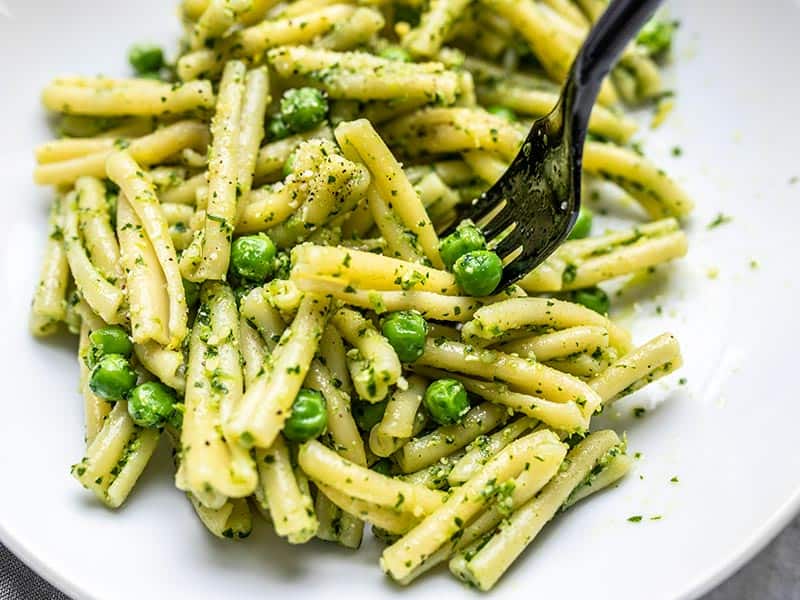
Parsley Pesto Pasta with Peas
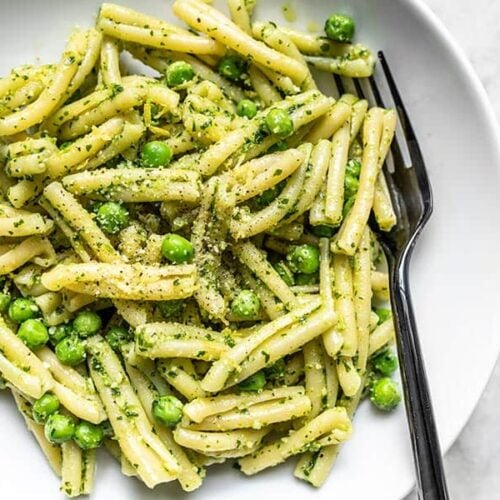
Ingredients
- 1 bunch flat leaf Italian Parsley (about 2-3 cups, loosely packed) ($0.89)
- 1 fresh lemon ($0.43)
- 1/2 cup grated or shredded Parmesan ($0.88)
- 2 cloves garlic ($0.16)
- salt and pepper ($0.05)
- 1/4 cup olive oil ($0.52)
- 1 lb. pasta* ($1.99)
- 1 cup frozen peas ($0.38)
Instructions
- Rinse the parsley well to remove any dirt or debris, then pat it dry with a clean, lint-free towel. Cut off the ends of the parsley stems and place the rest, leaves and stems, in the bowl of a food processor.
- Zest and juice the lemon. Add half of the zest and about 2 Tbsp of the juice to the food processor, along with the Parmesan, garlic cloves (peeled), and some freshly cracked pepper (about 15 cranks of a pepper mill).
- Pulse the mixture until everything is finely minced and combined. Begin to add the olive oil in a thin stream through the chute of the processor as it blend the mixture together. Once the oil has been incorporated, add salt to taste. I added about 1/4 tsp salt.
- Bring a pot of water to a boil for the pasta. Once boiling, add the pasta and continue to boil until the pasta is al dente. At the very end of the cook time, add the frozen peas and stir to combine. Let the peas sit in the hot water with the pasta for about a minute, then drain the pasta and peas in a colander.
- Allow the pasta to cool just to the point where it is no longer steaming heavily. Transfer the drained pasta to a bowl and add the parsley pesto. Stir to combine, then serve warm. Add a pinch of the remaining lemon zest over top of each serving.
See how we calculate recipe costs here.
Equipment
- Food Processor
- Grater
- White Cutting Boards
Notes
Nutrition
Scroll down for the step by step photos!
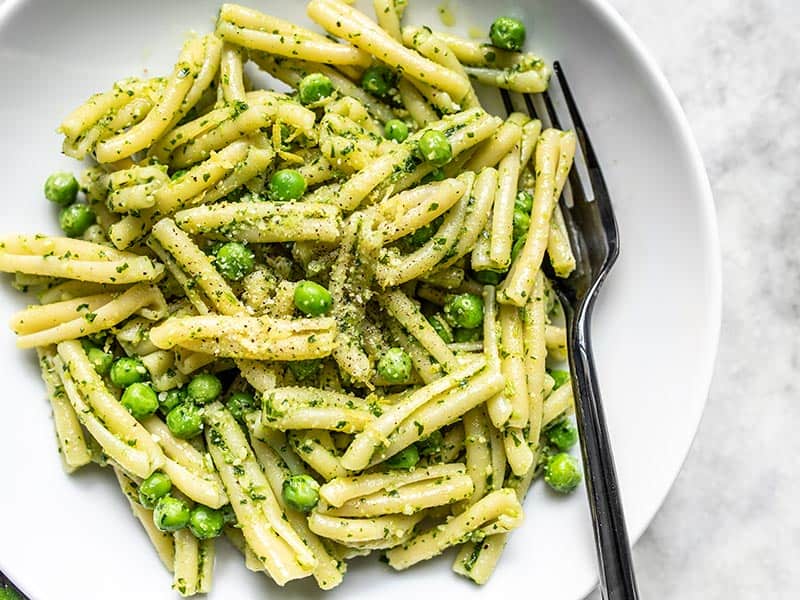
How to Make Parsley Pesto Pasta – Step by Step Photos
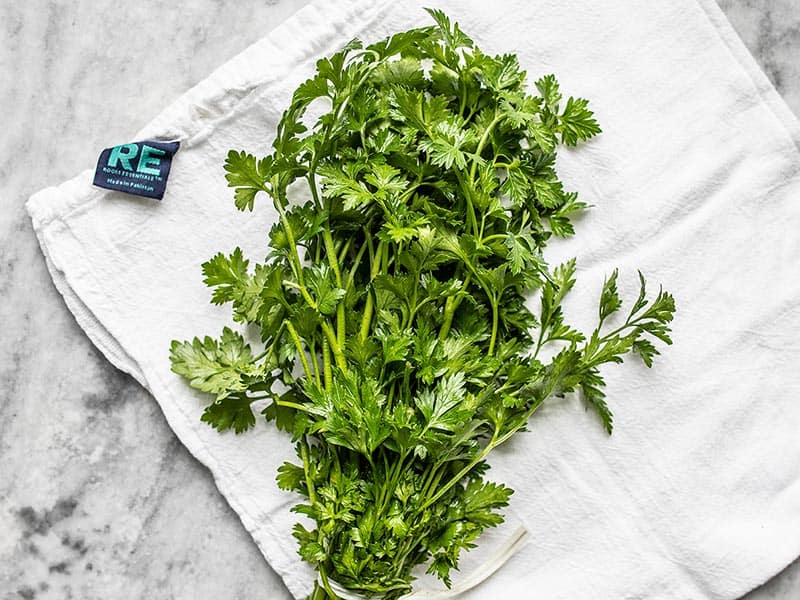
Begin by rinsing the parsley well to remove any dirt or debris. Sandy pesto is NOT fun (or good). Pat the parsley dry with a lint-free towel because watery pesto is also not good. Parsley stems are totally fine to eat and include in the pesto, so just cut off the ends and put everything else into a food processor.
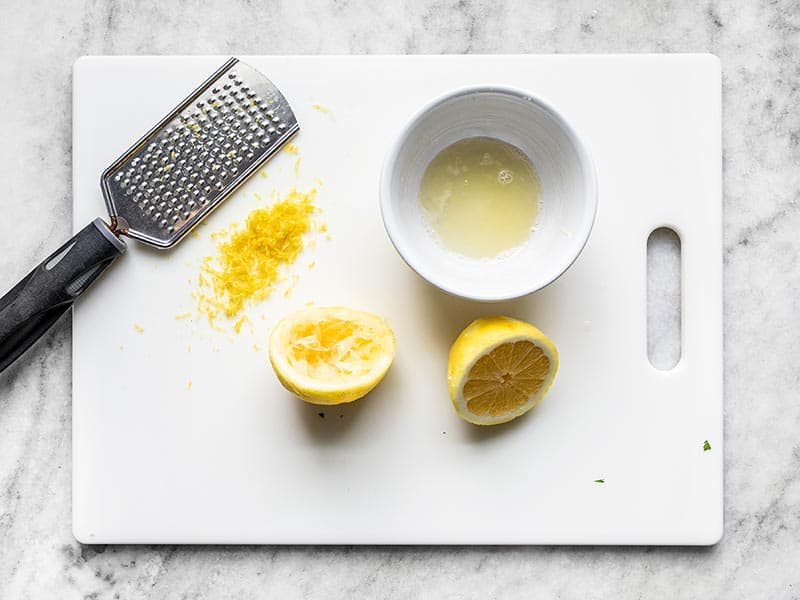
Zest and juice one fresh lemon. This is the perfect use for any frozen whole lemons, if you have them stashed in your freezer!
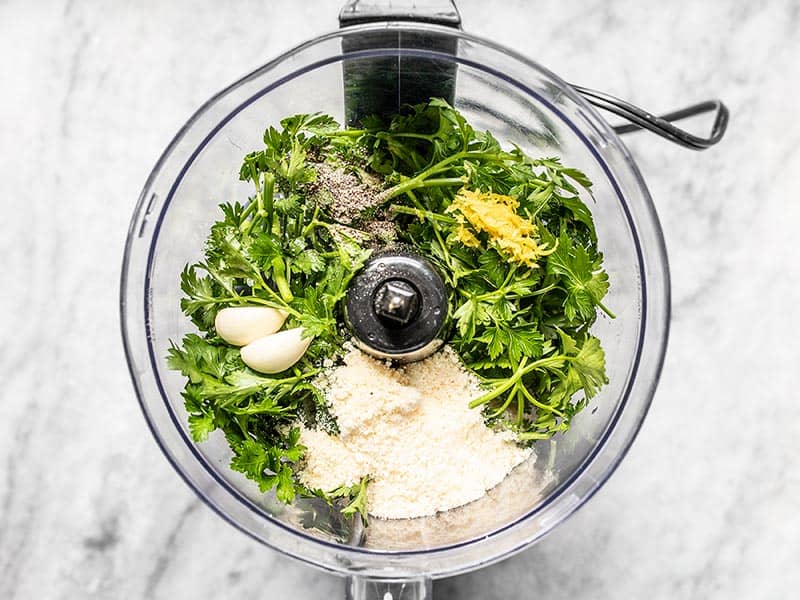
Add about half of the lemon zest, 2 Tbsp of the lemon juice, 1/2 cup grated Parmesan, 2 cloves of garlic (peeeled), and some freshly cracked pepper (about 15 cranks of a pepper mill).
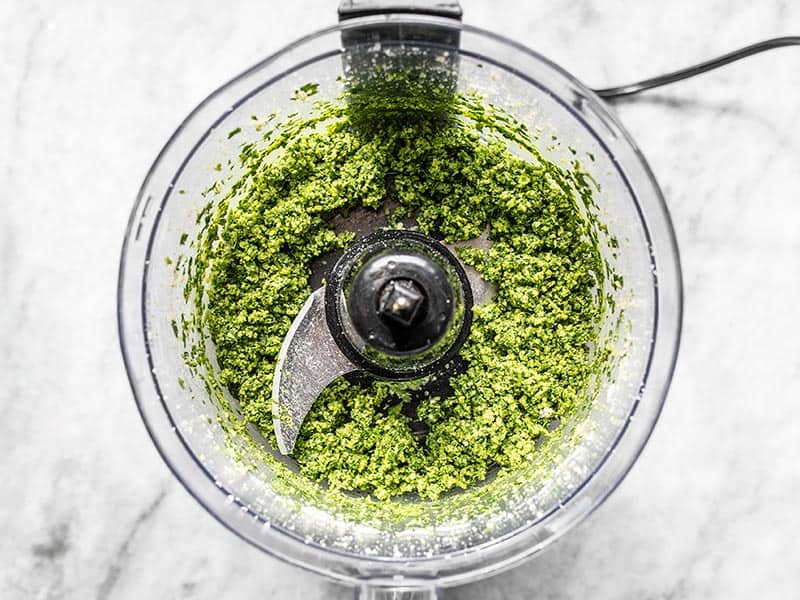
Pulse these ingredients together until they are minced and well combined.
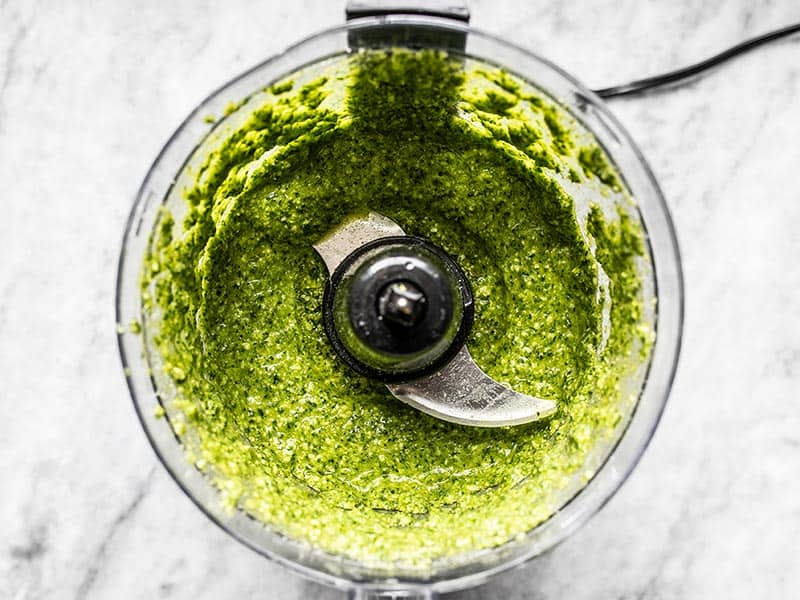
Then slowly start to add 1/4 cup olive oil through the chute in the food processor as the ingredients are processing. Once done it should be a bright green saucy consistency.
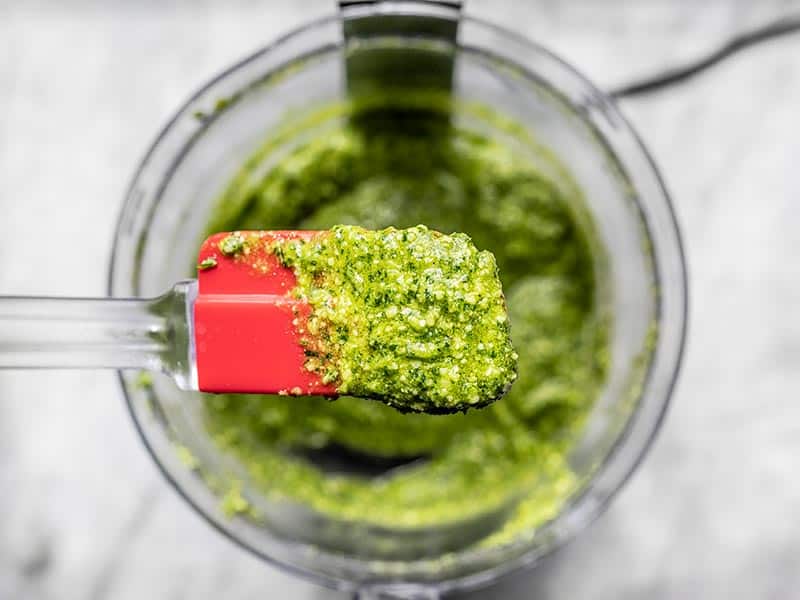
Check out that color!! This stuff is seriously amazing. Now it’s time to add the salt and really make the flavors pop. Add salt to taste. I added 1/4 tsp.
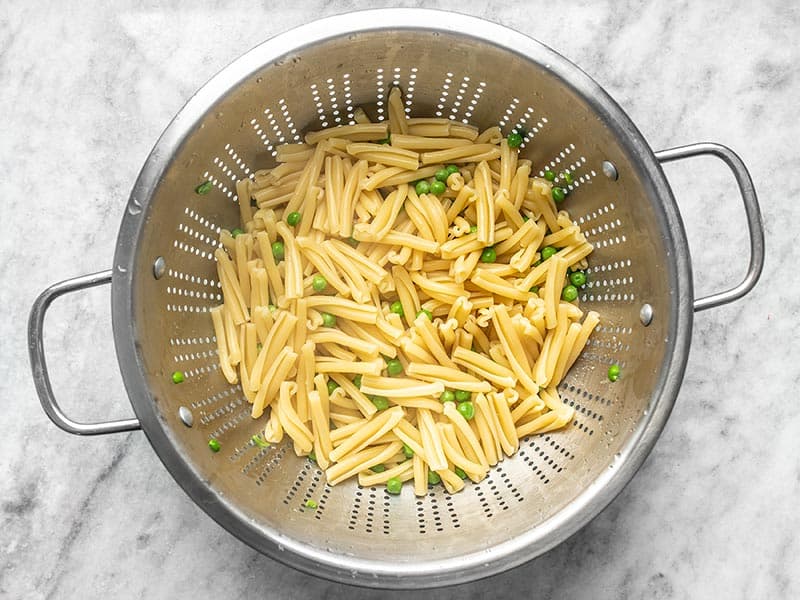
Bring a pot of water to a boil for the pasta. Once boiling, add 1 lb. pasta (I used casarecce, but any short textured pasta will do), and boil until the pasta is al dente. Once it’s tender, add 1 cup frozen peas and stir to combine. Let the peas sit in the hot water with the pasta for one minute, then drain in a colander. Let the pasta cool for a few minutes, or just until it’s no longer steaming heavily (you don’t want it to actually melt the Parmesan in the pesto).
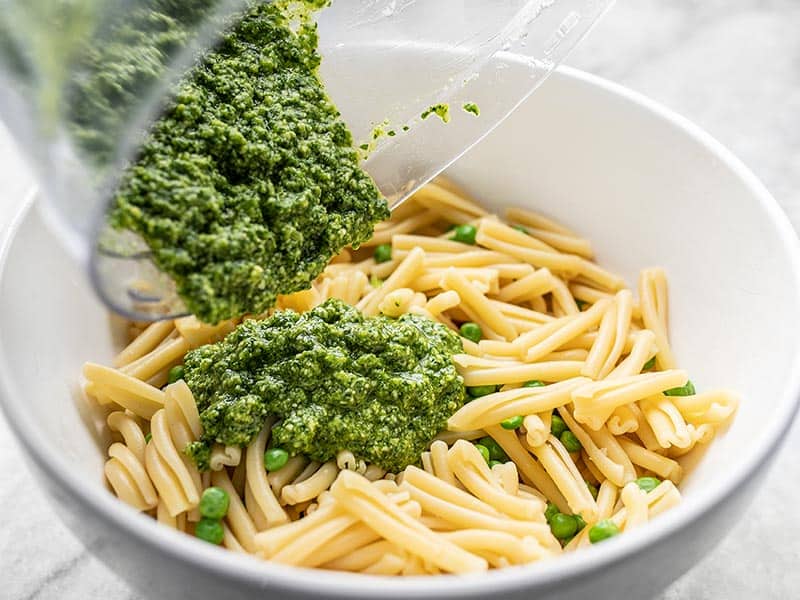
Once the pasta is slightly cool and well drained, transfer it to a large bow. Add the parsley pesto and stir to combine.
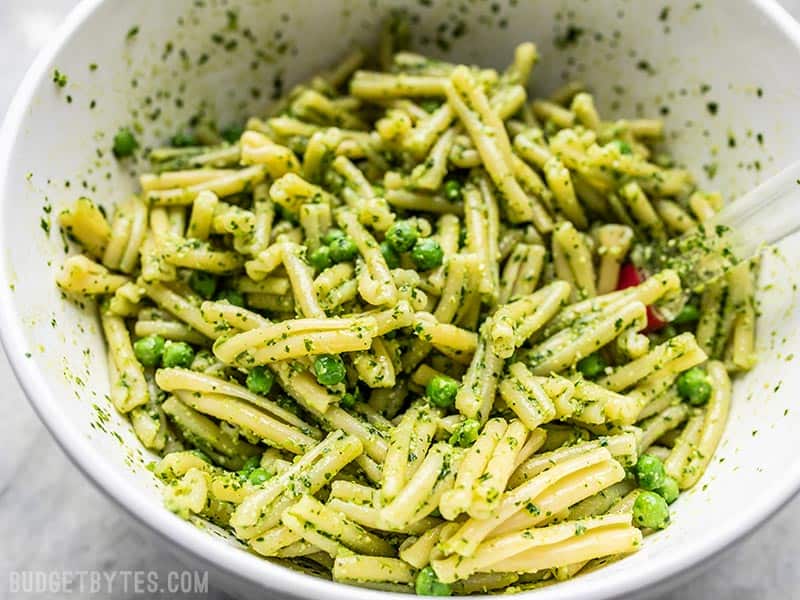
Yessss, look at all that freshness!
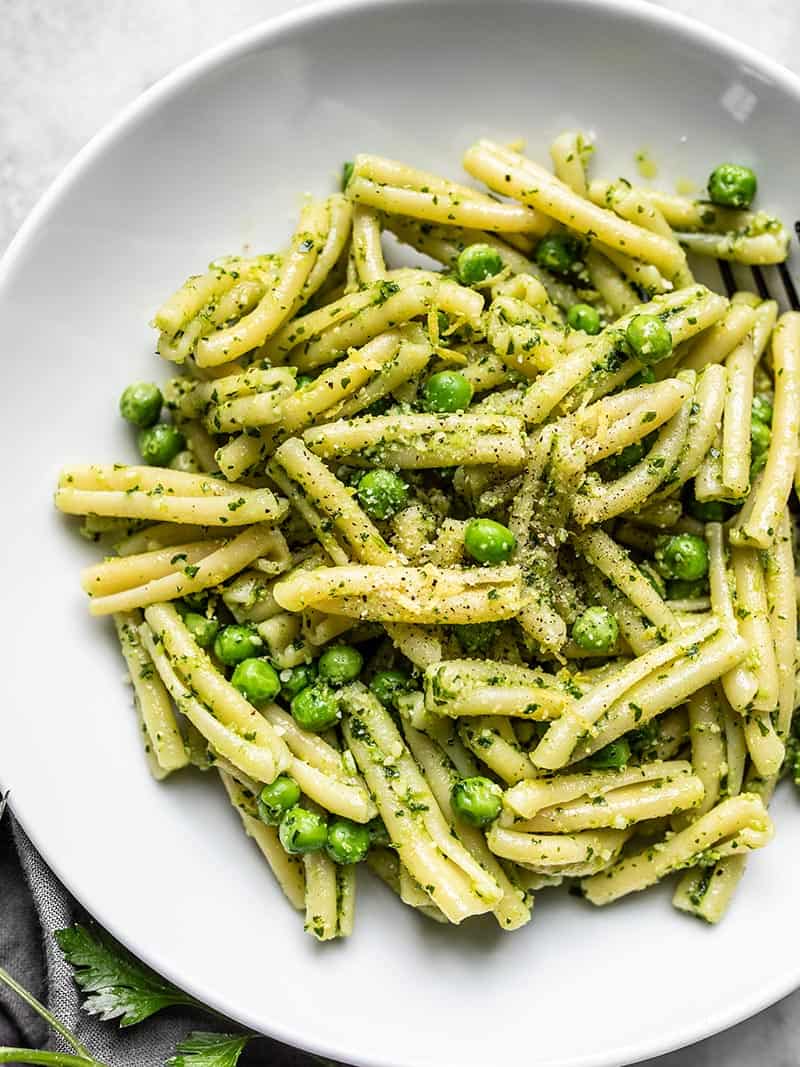
Add a pinch of the remaining zest to each bowl before serving (you can also add extra pepper or Parmesan, if desired). Dig in!


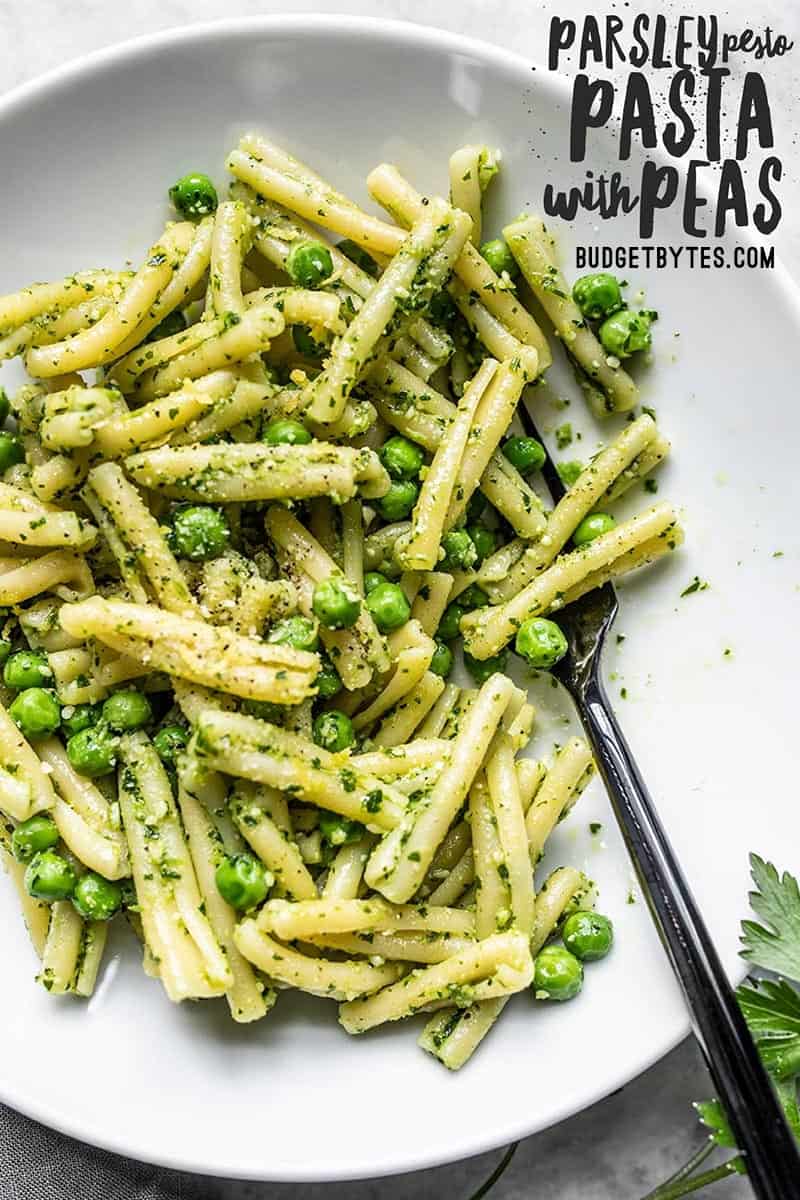
AMAZING! I totally forgot the peas and made it dairy free (using daiya), but this recipe is so good!
I am laughing at myself. I consider myself an accomplished cook, but it never dawned on me to leave the nuts out of pesto. I love pesto, but am not crazy about having nuts in it. I will save the walnuts for Mexican Wedding cookies. Thanks for the inspiration!
What is your favorite way to make non-dairy “pesto”? Is the best option to use one of the vegan cheese alternatives, or is there a different substitution you suggest?
P.S. While the original recipe is nut-free are a nut loving household, so don’t hesitate to suggest a nut-containing alternative
I haven’t really experimented with cheese alternatives for pesto, so I can’t offer any good advice on that. I think your best option would be to Google dairy-free pesto to see what others have experimented with and found to be the best tasting. I bet Minimalist Baker has something good!
Can you make the pesto a head of time to make a weeknight meal faster?
You most definitely can make it ahead of time.
This was a quick and easy weeknight meal! I made it for my mom and she is normally picky about peas but she loved it!
Hooray! Happy to hear it Amanda.
Is this recipe doable without a food processor?
Yes you could do it in a blender or really finely chop everything and mix into a bowl. Still delicious!
Made this for my mom and sister, they both liked it and went back for seconds. This is the second recipe I’ve tried from your site and both turned out great, thank you :)
So delicious! The raw garlic had a nice bite, and the lemon zest gave good freshness. This was the perfect Friday night meal. We both agreed that we wouldn’t mind more peas, so we may double them next time. We used block parm – instead of grating, we sliced thinly, which worked out well. And I love how this is so much cheaper than other pestos because of no nuts. A keeper for sure!
I made this last night. It was wonderful. I put sundried tomatoes in in place of the peas. I am going to try this pesto on roasted carrots next week for passover when I have to go noodleless.
This looks like it’d go great with a bottle of wine on a Friday night. Will def try!
My finished product seemed a bit bitter. Any suggestions on how to remedy? Maybe it was the age of the parsley???
Hmm, yes, it could be your parsley. Maybe try using less next time. Also maybe taste some of your pesto straight to make sure that’s not giving off a bitter flavor.
I bought frozen artichoke hearts to use in this because my husband doesn’t like peas. How do in incorporate them? Thanks!
You should be able to just thaw them and stir them in (check the package to see if it suggests cooking them, if so, follow the directions for cooking before adding them to the pasta). You might also want to give them a rough chop to make them smaller pieces. :)
If I am super lazy(don’t judge), how much pesto would I add instead of making it?
Probably about 1 cup, give or take some. :) And no judgement here! I take short cuts alllllll the time. ;)
Thank you for being brave enough to ask this question, I was reading through the comments for this exact piece of info hahah One day, I will try this recipe from scratch but today, I’m working with what I have! And thank you, Beth, for not judging 😂
I love that you actually tested it with shaker parm. Most recipes, even the front’n budget sites are all about the fancy block parms. I appreciate very much that you tested this from an economical standpoint. Sometimes I can afford a block, but sometimes I can’t and most recipes do not say if shaker parm will work. Rn I’ve got shaker in my fridge so I know I can make this recipe and it’ll work out well. Thank you ✌️
New user to this site 🤞
Looking forward to trying a good few.